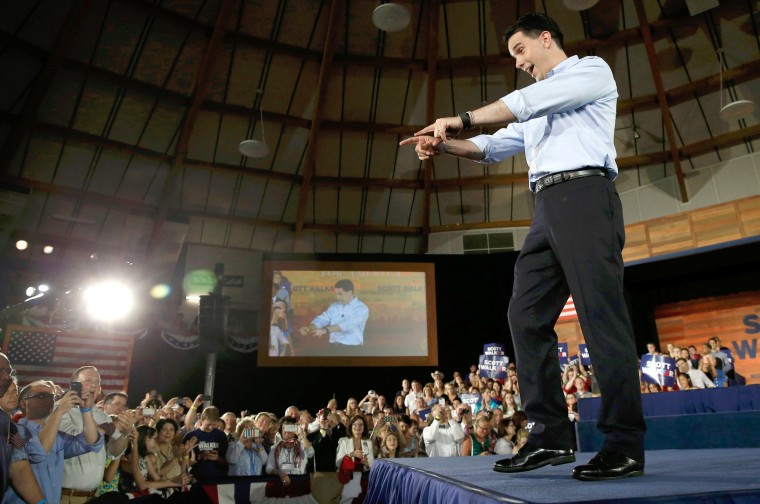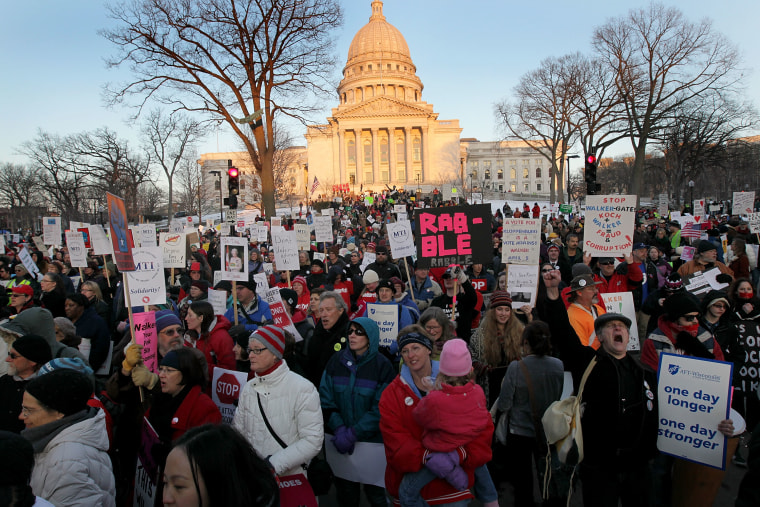Today Scott Walker becomes the 15th Republican to enter the presidential race. This means that the Republican field has officially expanded from the size of the Wu-Tang Clan, to the size of a really old, very wealthy and ideologically fractious pick-up pro basketball team.
NBCBLK is putting together a series of articles posing practical questions towards candidates running for office: Jeb Bush, Chris Christie, and Bernie Sanders for starters.
We don’t presume an “African American” political agenda, (something that may or may not exist for that matter). Instead we look at policy and home turf issues, and evaluate how those factors would specifically impact African American voters.
In 2014, Governor Walker won 56 percent of the white vote and 10 percent of the African American vote. So ask yourself this question: If Scott Walker was to pursue the African American vote with the same effort and sincerity that he uses to approach traditional Republican constituencies – what kinds of questions would he be expected to answer?
1. What is the African American Agenda for Scott Walker?
While this might be a general question for all presidential candidates it’s particularly important for Wisconsin’s Governor given some damning statistics from his home state. The site 24/7 Wallstreet, by no means a left leaning news site, listed Wisconsin as the worst state in America for African Americans.
Wisconsin has the highest African American unemployment rate in the nation, the 7th lowest homeownership for African Americans in the nation, Milwaukee has been repeatedly noted as one of the most racially segregated cities in America, and Wisconsin has some of the poorest African American children in the nation.
30 percent of Wisconsin’s white children are living at 200 percent below the poverty level, compared with 60 percent of Latino and Native American children. For African American kids, that rate spikes to 80 percent. As nominee, Walker would have to account for these kinds of statistics and explain specifically what his agenda to target the African American community would entail.

2. What is the Walker Plan on Criminal Justice Reform?
Scott Walker has been a tough “Law and Order” politician since he was first elected to office. He’s pushed through “Truth in Sentencing” legislation, battled to reduce or eliminate parole, and endorsed tougher and longer sentences. In fact, at a time when many Republicans including Newt Gingrich, Rand Paul, Chris Christie and even Walker’s political patrons the Koch Brothers, are calling for reforms to reduce or at least better manage mass incarceration Walker has moved even further right. This is of particular note to the African American community because Wisconsin leads the nation in incarceration rates for African Americans.
Walker has also been caught on tape talking about how he entertained using agent provocateurs to disrupt protests over union pay back in his state, so one can only imagine how he might deal with #BlackLivesMatter protests. Black voters should ask Scott Walker what his views are on issues such as police brutality, mass incarceration and sentencing reform, because thus far he’s been somewhat reluctant to speak on those issues, even if his policy positions have been quite clear.

3. What is the Walker alternative to unions?
Governor Walker has been in a perpetual battle with state employee unions since he took office in 2010 and has won (with a lot of outside financial help) every single battle. Walker ended collective bargaining for state employees, and just this week ended universal tenure for faculty at University of Wisconsin schools. Unions, certainly public employee unions have been a key protection for African Americans moving into the middle class across the nation. A Walker candidacy should be able to explain how he will go about protecting workers and minority workers in particular if union protection and collective strength is diminished.
